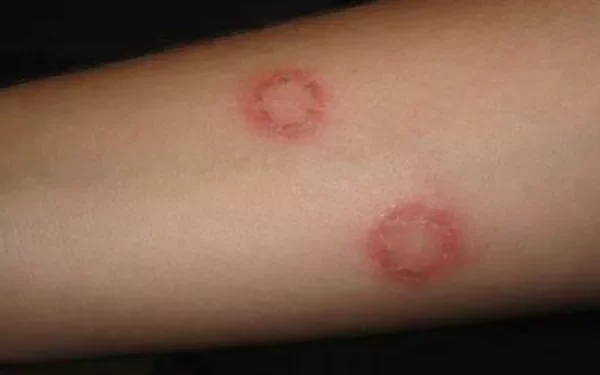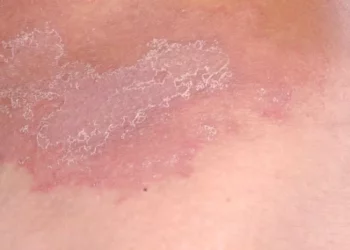Ringworm is a common fungal infection that affects the skin, causing red, itchy, and circular rashes. Despite its name, ringworm is not caused by worms. It is a fungal infection caused by dermatophytes, which are a type of fungus that thrives on keratin, the protein in your skin, hair, and nails. Ringworm can appear anywhere on the body and is most often found on the arms, legs, or torso. While it is treatable, knowing which medicine works best is crucial to effectively manage the condition.
Understanding Ringworm
Before discussing the medicine for ringworm, it is important to understand what it is. Ringworm, also called tinea, is a contagious skin infection. It gets its name from the characteristic ring-shaped rash that appears on the skin. The infection is typically caused by three types of fungi: Trichophyton, Microsporum, and Epidermophyton. Ringworm can spread through direct skin-to-skin contact with an infected person or by touching contaminated objects like towels, clothing, and furniture.
The symptoms of ringworm include:
- A red, itchy rash in the shape of a ring.
- Scaly, flaky skin.
- Raised borders with a clearer center.
- Cracked or blistered skin.
If you suspect you have ringworm, it is best to start treatment as soon as possible to avoid spreading the infection.
Common Medicines for Treating Ringworm
There are several effective medicines for treating ringworm, including topical treatments, oral antifungal medications, and natural remedies. The choice of medicine often depends on the severity and location of the infection.
Topical Antifungal Creams
For mild cases of ringworm, topical antifungal creams are usually the first line of treatment. These creams are applied directly to the affected area of the skin. Common topical antifungal medications include:
Clotrimazole: Clotrimazole is an over-the-counter antifungal cream that works by inhibiting the growth of the fungi causing the infection. It is commonly used to treat ringworm and other skin infections like athlete’s foot and jock itch. You can apply it to the infected area twice daily for about 2 to 4 weeks.
Terbinafine: Terbinafine is another popular antifungal cream that is effective in treating ringworm. It works by stopping the growth of the fungus. It is available in both cream and spray form. Apply terbinafine to the affected area once or twice a day. Treatment generally lasts for 1 to 2 weeks.
Miconazole: Miconazole is a well-known antifungal cream used to treat various fungal infections, including ringworm. It works by destroying the cell membrane of the fungi, preventing it from growing. Miconazole is applied once or twice a day for a period of 2 to 4 weeks.
Ketoconazole: Ketoconazole is another effective antifungal cream. It targets fungal cells by disrupting their ability to create a cell membrane. This cream is typically applied once daily for 2 to 4 weeks.
While these medications are generally effective, it is essential to follow the instructions carefully and continue the treatment for the full recommended duration, even if the symptoms disappear. Stopping the treatment too early may lead to the infection returning.
Oral Antifungal Medications
In more severe or widespread cases of ringworm, or if the infection doesn’t improve with topical treatments, doctors may prescribe oral antifungal medications. These medications are more powerful and can treat deeper or larger areas of the infection. Common oral antifungal medicines include:
Griseofulvin: Griseofulvin is an oral medication that is often prescribed for severe or widespread cases of ringworm. It works by disrupting the fungal cell division process. Treatment usually lasts for several weeks, and it is taken daily with food to improve absorption.
Terbinafine (oral form): Terbinafine is also available in oral form for treating more serious fungal infections. This medication is effective in treating infections that are not responding to topical treatments. It works by blocking the synthesis of ergosterol, a vital component of fungal cell membranes. Terbinafine is typically taken once a day for 4 to 6 weeks.
Itraconazole: Itraconazole is another oral antifungal medication used for treating ringworm. Like other antifungals, it works by inhibiting the growth of the fungus. Itraconazole is typically taken for 1 to 2 weeks, depending on the severity of the infection.
Fluconazole: Fluconazole is an oral antifungal medication that may be used for ringworm. It is particularly effective in treating fungal infections of the skin, nails, and mucous membranes. Fluconazole is generally taken once a week for a few weeks.
Oral antifungals are typically reserved for more extensive or persistent cases and should only be used under the supervision of a healthcare provider.
Natural Remedies for Ringworm
Some people prefer natural remedies to treat ringworm. While these remedies may not be as scientifically proven as pharmaceutical treatments, some individuals find them helpful in managing mild cases. Common natural remedies include:
Tea Tree Oil: Tea tree oil is known for its antifungal and antibacterial properties. Applying diluted tea tree oil directly to the affected area may help kill the fungi. However, it’s important to dilute the oil, as it can cause skin irritation when used undiluted.
Garlic: Garlic contains compounds that have antifungal properties. Crushing a few garlic cloves and applying the paste to the affected area can help reduce the symptoms of ringworm. However, garlic can also cause skin irritation, so use it with caution.
Coconut Oil: Coconut oil has antifungal and moisturizing properties. Applying it to the infected skin may help soothe the rash while also fighting the fungus. It can be used several times a day for mild cases of ringworm.
Aloe Vera: Aloe vera is known for its soothing properties and may help reduce inflammation caused by ringworm. Applying fresh aloe vera gel to the infected area can help moisturize the skin and reduce itching.
While these natural remedies may offer some relief, they should not replace conventional antifungal treatments, especially for moderate to severe infections.
Tips for Preventing the Spread of Ringworm
Ringworm is highly contagious, so it’s essential to take precautions to prevent it from spreading to others or other parts of your body. Here are some tips to help prevent the spread of ringworm:
Keep the affected area clean and dry: Fungi thrive in warm, moist environments, so keep the infected area clean and dry.
Wash your hands frequently: Wash your hands thoroughly after touching the infected area, and avoid touching other parts of your body.
Avoid sharing personal items: Do not share towels, clothing, or other personal items with others until the infection is fully treated.
Disinfect surfaces: Clean any surfaces that may have come in contact with the infected area, such as bedding, furniture, and clothing.
Wear loose, breathable clothing: Tight or non-breathable clothing can create an environment conducive to fungal growth. Opt for loose clothing made of natural fibers like cotton.
Stay away from infected individuals: If someone you know has ringworm, avoid direct contact until they have been treated.
When to See a Doctor
Most cases of ringworm can be treated effectively with over-the-counter antifungal medications. However, if the infection does not improve after using these treatments for a few weeks, or if it worsens, you should consult a doctor. Other signs that you may need medical attention include:
- The rash is spreading rapidly.
- The infection is causing significant pain or swelling.
- There is excessive redness or warmth around the affected area.
- The infection involves the face, scalp, or nails.
A doctor may prescribe stronger antifungal medications or conduct tests to rule out other conditions.
Conclusion
Ringworm is a common fungal infection that can be treated with various antifungal medications. Topical treatments like clotrimazole, terbinafine, and miconazole are typically effective for mild cases, while oral antifungal medications such as griseofulvin, terbinafine, and itraconazole may be necessary for more severe or persistent infections. Natural remedies like tea tree oil and garlic may offer relief for some individuals but should be used with caution.
By following proper hygiene practices and adhering to treatment recommendations, you can effectively treat ringworm and prevent its spread. Always consult a healthcare provider if you are unsure about the best course of treatment for your condition.
Related topics



























